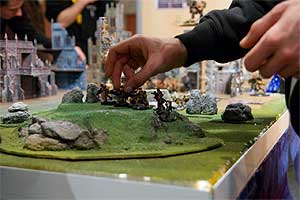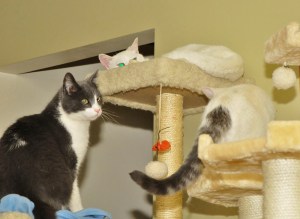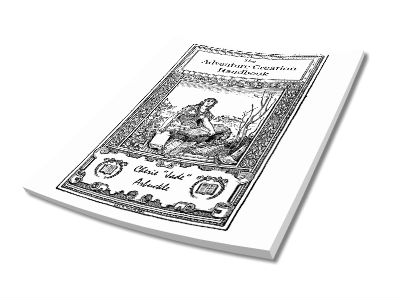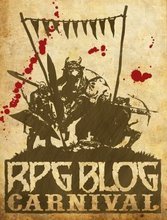 So far, in this series of posts on creating a full adventure from an adventure seed, we’ve written down the adventure seed and asked ourselves questions about it, then answered the who and what questions of our adventure, now onto our “when” and “where” questions. Once we’re done with the questions, we’ll move into creating the actual events of the adventure.
So far, in this series of posts on creating a full adventure from an adventure seed, we’ve written down the adventure seed and asked ourselves questions about it, then answered the who and what questions of our adventure, now onto our “when” and “where” questions. Once we’re done with the questions, we’ll move into creating the actual events of the adventure.
[Photo courtesy of Orin Zebest via Flickr Creative Commons 2.0]
When Questions
When is this performance to take place?
How much time do we want to give our PCs to prepare for their assignment? We want to let them have some preparation time, but we don’t want to slow down the adventure by giving them too much time so that they run off on tangents. Lets give them a week. So, the performance is going to take place one week from the time the PCs get their assignment.
What is the current date?
This is the in-game date. If we’re hooking this adventure into a larger campaign, the current date can be significant. If this is a stand-alone adventure, we don’t really have to set the current date. But it might be useful for us to figure out how much time the princess has spent in seclusion already (two months–so she’s definitely ready to talk to someone from the outside world) and how much more time she has left to go (four months, which seems like an eternity to her at the moment).
How much time do the PCs have to prepare?
We’ve answered this question above, but we’ll restate it here: one week.
How much time do the PCs have to complete the mission?
They basically have as long as the performance lasts to get everything set up. They should plan on actually getting the princess out as soon as possible after the performance.
How long is the performance to last?
Two hours.
Where Questions
What is the nation is the princess from?
If you’re using an already created game world, you’ll want to make her a member of a nation that already exists on that world. But let’s assume that we’re creating this game world from scratch as we go along. So we’ll call the princess’ country “Sunfall”, and place it in the eastern half of our new game world (where the sun seems to set).
Is the PCs’ employer from the same nation, or a different one?
The same nation. He’s her younger brother.
Is it the same nation as the PCs?
For maximum impact, lets make the PCs from a different country and call it “Seavale”, a coastal nation. Seavale borders Sunfall, but relations have been strained between the two countries (yes, I am making this up as I go along 😉 ). Prince Alexei deliberately looked for people from Seavale, so that if something went wrong with the plan, he could claim that Seavale agents were trying to kidnap the princess for their own ends.
Where is the compound located?
Near Sunfall’s royal palace, which is located near the middle of the kingdom. The compound is close by, in case relatives want to visit and so that the king and queen can visit and more easily keep an eye on who comes and goes from the princess’ seclusion location. But let’s say it’s between the palace and the Seavale border, which means that the far side of the compound is going to be well-guarded by people the king can trust.
Where is the performance to take place?
Let’s interpret this to mean “where in the compound the performance will take place”, since we already know that the performance will take place in the seclusion compound. We’ll schedule to performance to take place in the compound’s inner courtyard.
What is the adventure’s starting location?
The prince will want to meet the PCs somewhere where they can talk freely and he won’t be recognized. The first thing that leaps to mind is the very much overused seedy tavern, just inside the Seavale border. Trite though it is, this location does have a lot of aspects in its favor. For one, if we posit that the crown prince has kept a very low profile in the kingdom, so much so that few people outside of the royal family would recognize him, he should be able to come and go from from such a place without notice or comment (unless someone does recognize him…). People in these types of places are used to minding their own business. Depending on how competent we want our prince to be, he can either dress down to match his surroundings (the prudent course of action) or he can flaunt his wealth, attracting every major pickpocket and cut-purse in the area, which could create some wonderful complications to the adventure.
What is it’s ending location?
That will depend on if the PCs get the princess out or not. If so, the adventure will end at a “safe house” the prince has set up on the border of the kingdom. If not, the adventure is likely to end in the princess’ seclusion compound. Either way, we should have the safe house location prepared.
What other locations might be important?
The castle, the wizard’s tower are all possible locations, but the bulk of the adventure should take place in the princess’ compound, so that’s the location we’ll spend the bulk of our location preparation time on.
What are the languages, customs, and practices of the entertainers? Are they different from the PCs?
We could go hog-wild on this one and set them up with a different language and some really unusual customs, making them originally from a very different culture than the PCs. But I don’t want to spend time on that aspect, so we’ll make all of them–the PCs and the entertainers–from the same basic area, Seavale.
However, theatre people tend to be a superstitious lot, so we can have a little fun with the PCs by giving our troupe of players a few quirks, but not so many that they take over the game session. So, first, we can have the actors begin their day with offerings to whichever god in the campaign world watches over performers and traveling players, followed by a couple of hours of vocal and physical warm-up exercises. So unless you’ve got a party full of bards, that should help push the PCs out of their comfort zone somewhat.
The day would continue with rehearsals of the current performance, as well as some stage combat practice (less deadly, but just as demanding as real combat practice)., finally concluding with some street performances to bring in needed money. The PCs will be expected to take part in these, so that they can learn what they need to know to preserve their cover.
We can also give the troupe a couple of superstitious habits, based on real-world theatre superstitions, the primary one being the practice of never wishing “good luck” to someone going on-stage (hence the real-world practice of saying “Break a leg”). Let’s say that actors in this world say “Crack your head”. Also, having a black cat in the theatre house prior to performance is said to bring good luck and a successful play. Since ours are traveling players, they don’t usually perform in theatres, so let’s say they keep their own pet black cats who travel with them as companions and that it’s a very bad omen if one runs away or gets harmed.
Next time, we’ll finish up the questions with “why” and “how”.
Other posts in this series
 Setting up a campaign can be a challenge. Where do you start? What’s important to develop before play? How the heck do you even start planning a campaign?
Setting up a campaign can be a challenge. Where do you start? What’s important to develop before play? How the heck do you even start planning a campaign?
















![Reblog this post [with Zemanta]](http://img.zemanta.com/reblog_c.png?x-id=9710b3e7-6df7-488a-8f0c-9900d4d3cbc8)




